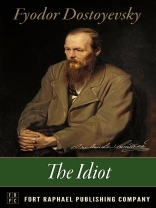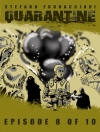The Idiot is perhaps Fyodor Dostoyevsky’s most light-hearted and comedic work and has long been praised for its experimental style and original themes.
The title springs from the fact that the main character in the novel, the fair-haired and sheltered Prince Myshkin, is a naive and sweet-natured young man whose guilelessness and easy-going nature lead those around him to assume that he is dim-witted and slow. After arriving in St. Petersburg from a four-year stay at a Swiss hospital- where he was treated for epilepsy- the Prince becomes ensnared in the various goings-on among the high-class society members and military brass of the city. Romantic entanglements ensue and the Prince finds himself at the center of a number of personal disputes, financial calamities and jealous rivals.
A mid-career novel of Dostoyevsky’s, The Idiot helped establish him as one of Russia’s leading literary figures and we are proud to present the manuscript in its original and unabridged format, as translated by Eva Martin.
Tentang Penulis
Fyodor Dostoyevsky (1821-1881) was a Russian novelist, essayist, short story writer and journalist. He is considered by literary critics to be not simply the greatest writer in Russian history, but one of the greatest writers of all time. He has been cited by many authors – Aleksandr Solzhenitsyn, Anton Chekhov, Friedrich Nietzsche, Albert Camus, and Jean-Paul Sartre among them – as having profoundly influenced their own works. Fyodor was introduced to literature at an early age and was drawn to writing, but he was forced to enter a military academy after the death of his mother. A poor cadet, Fyodor whipped himself into shape after the death of his father and graduated with a strong academic record. His epilepsy was also diagnosed about this time. Upon graduation, Fyodor continued his military career by becoming a lieutenant engineer, but almost immediately began writing as well, completing his first book, ‘Poor Folk, ‘ in 1845. The success of the book encouraged him to continue writing, but as he became involved in politics, he began to into serious trouble with the authorities. Fyodor was imprisoned (and almost executed) for belonging to a progressive literary group that the Tsarist government thought traitorous. He served four years in a labor camp before being released in 1854. Fyodor had a serious gambling addiction and was always in financial straits of one kind or another. He serialized and published ‘Crime and Punishment’ in 1866 and married his second wife, Anna Snikina, shortly afterwards. After an extended, four-year honeymoon, they returned to Russia. By this time, he had completed and published ‘The Idiot’ and had established himself as a leading Russian author. He and Anna published ‘Demons’ in 1873 for the newly founded ‘Dostoyevsky Publishing Company, ‘ and the family finally enjoyed financial stability. As his fame increased, Fyodor’s health deteriorated. His epileptic seizures increased but he still continued working, producing what many consider his finest work just prior to his death, publishing ‘The Brothers Karamazov’ in 1880. The following year, Fyodor suffered a series of pulmonary hemorrhages and died at home surrounded by his family.












